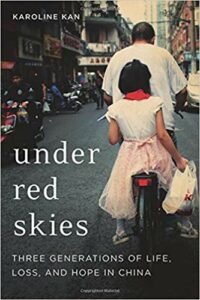
Review of Under Red Skies: Three Generations of Life, Loss and Hope in China by Karoline Kan. Hachette, 2019.
Like their counterparts elsewhere, China’s millennials are known for their individualism, even if their pursuit of identity is more aspirational than realized. Under Red Skies is a memoir of China’s Reform and Opening Up era through the eyes of one millennial and the distance the pursuit of modernity creates between her and her family.
There have been a number of books on the generation that has come of age amid China’s breakneck growth, but most have been written from the vantage point of foreigners, a point of implied frustration for Karoline Kan, the author. “I respect many of these,” she allows, “because they inspired me to write my own.” Born in a rural village outside of Tianjin in 1989, Kan is lucky to be alive at all. Her inspiringly independent mother, who had already had a son, evaded enforcement of the one-child policy to bring the daughter she longed for into the world.
By writing this book as a memoir instead of a generational survey, Kan loses the opportunity to fully deploy the journalistic skills she defied her family to pursue. Kan repeatedly connects her early life and family background to the broader forces shaping China. Her family joins the millions of rural migrants in search of greater economic opportunity; her grandfather embraces and continues to secretly follow the banned Falun Gong spiritual movement; and a “shadow of death” is cast over her town from fear of SARS, about which the government suppressed information.
In tying herself to these broader events in a way intended to provide context, Kan’s individuality is at times effaced from the narrative. It is effective when she remains focused on her grandmother and mother’s personal experiences: too little remains told about the hardships of their time, including the Great Famine of 1959-1961, and particularly from the vantage point of China’s women.
On two occasions, old certainties would change suddenly – and literally – under her grandmother’s feet. Revolutionaries would arrive in her village, declaring an end to feet binding just days after she had begun the painful process; later, three days after she and her husband received title to their land, the Communists declared it belonged to the public.”Life had taught Laolao that stability was not guaranteed; nothing was permanent, and that it would be foolish to trust in anything unconditionally.” When Kan would leave a few grains of rice in her bowl as a child, her grandmother would remind her, “‘When your mother was your age, she ate rice only in her dreams.'”
By the time the memoir turns decisively to Kan herself, she is on the verge of taking China’s grueling gaokao college entrance exam. Here her path diverges from her closest female cousin, who pursues factory work and becomes unexpectedly pregnant. Kan is admitted to Beijing International Studies University, where, armed with a VPN, she learns the truth about the Tiananmen Square protests: “China collapsed for me suddenly. I no longer understood what was in front of me. I had no faith in what I had been brought up to believe.”
For many westerners, like this millennial reviewer, China’s universities are their first exposure to the country. In these chapters on Kan’s university years, the memoir is an engaging counterpoint to one’s own memories. Initially directed to pursue a major in finance, as graduation approaches Kan finds herself unwilling to give up her dream of writing. Soon she is working for That’s Beijing and initiated into the city’s glitzier haunts, alternating between insecure disdain for her rural roots and the pretentious milieu she now covers. She shocks her family by falling for a white guy. Very little of what remains of the memoir involves her work writing for outlets including the New York Times.
What China’s millennial generation will yet do as opposed to what they have already experienced is a question this memoir prompts but does not answer. How will their global exposure reshape their expectations of themselves, their country, and what it means to be Chinese? As they become parents, will they perpetuate the culture of intensive pressure they were subject to or will they grant their children freer rein? As some begin to assume meaningful power and influence, will they lead their country with confidence in the potential of its people instead of authoritarian fear?
This reviewer’s own experience among some of China’s most privileged millennials is a cause for discouragement. Like millennials elsewhere, many readily see their success as the earned result of individual merit, not also the consequence of various advantages and dumb luck. Even as they demand greater freedom from the state for their own lives, too many repeat the line that most of China’s people are not ready for democracy. The cynicism of the West’s millennials, who grew up amid financial and political crisis, is understandable. The cynicism of China’s millennials, who came of age during unprecedented progress, is, in some ways, more troubling.
“It is easier to blame China than to understand it; it is easier to judge Chinese people than to get to know them,” Kan asserts in the introduction. Once, criticizing her uncle’s unwillingness to speak out, “I immediately regretted how cruel I sounded. Who was I to tell my uncle what he should and shouldn’t believe in? He was an old man and had never been as privileged as I was lucky enough to be. My generation had abandoned him. He had made a way for us, but we criticized him and everything his generation had built.” With great honesty, Kan shows how much misunderstanding of their country remains, not only among foreigners, but Chinese themselves.